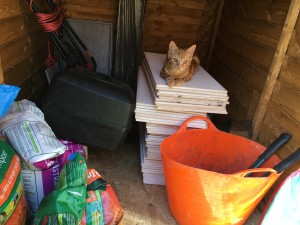 The warm weather has finally shown itself and we all enjoy this change in temperature, especially our furry friends who live outside. However, with the warmer weather comes the increased risk of fly strike to our pets, especially rabbits.
The warm weather has finally shown itself and we all enjoy this change in temperature, especially our furry friends who live outside. However, with the warmer weather comes the increased risk of fly strike to our pets, especially rabbits.
Fly strike, also known as ‘myiasis’ occurs when flies (especially blowflies – green bottles and blue bottes) lay eggs, usually around the vulva/penis and anus. These eggs hatch out into maggots and begin to eat the flesh of the rabbit, this can happen very rapidly and can result in death within 24 hours.
Are my rabbits at risk?
All rabbits, and potentially any other animals, are at risk from flystrike. Certain factors can increase this risk, such as:
- Time of year: fly strike is more common during warmer weather particularly during spring and summer
- Dirty Coat: this can occur due to diarrhoea if your rabbit is unwell, if they can’t clean themselves properly due to arthritis, dental pain or obesity, or urinary incontinence causing urine staining of the coat
- Wounds: the smell of blood can attract flies
How can I prevent Fly strike?
Good hygiene is essential in the prevention of flystrike
- Clean out urine / faeces from their hutch every day
- Check your rabbit’s bottom for dirt or maggots at least once a day, more if possible during summer
- If your rabbits bottom or faeces are unusually wet, seek veterinary advice to help resolve this issue and prevent your rabbit becoming dirty
- Groom your rabbit regularly, especially if it has a long coat
- Keep any wounds clean and dry, check multiple times a day
There are other management factors which can help you to prevent flystrike
- Do not over-feed your rabbit, being overweight makes them less able to clean themselves
- Feed mostly good quality hay, with some fresh leafy greens and only a small amount of pellets to ensure they have good dental health
- Regular health checks can help you monitor your rabbits weight, dental disease and detect any pain that may prevent them cleaning themselves
- Topical fly repellents are available which can help keep flies away, but do not replace good hygiene and regular checks to monitor for signs of fly strike
 What should I do if I think my rabbit has Fly strike?
What should I do if I think my rabbit has Fly strike?
Fly strike is very serious and can sadly be fatal, especially if found too late. Rabbits with severe infestations are often in a lot of pain and may be in shock. Depending on the severity it may be necessary to sedate your rabbit to clip away the infested fur, remove the maggots and carry out a thorough inspection. Do not wet your rabbit before the appointment as this will make the fur more difficult to clip. After this intensive medical management is often required.
It is important that if you think your rabbit has fly strike to seek immediate veterinary attention. If you would like any more information or think your pet may be affected please don’t hesitate to call us on 01606 880 890











